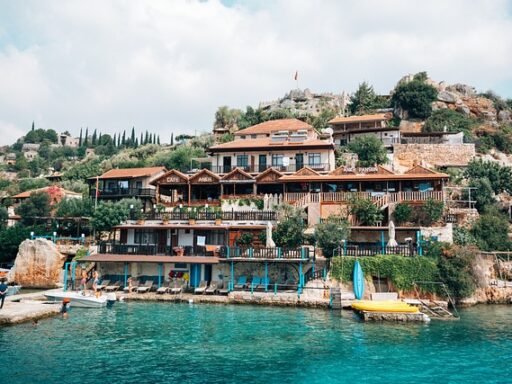Accessible Antalya: A Perfect Vacation for Disabled Travelers

When it comes to planning a vacation, inclusivity and accessibility are vital considerations, especially for travelers with disabilities. Antalya, a stunning coastal city in Turkey, emerges as an excellent option for those searching for a disability-friendly travel destination. With its beautiful landscapes, rich culture, and commitment to providing accessible services, Antalya offers a blend of relaxation and adventure for everyone. In this article, we will explore why Antalya is an ideal vacation spot for disabled folks and provide valuable tips on making the most of your trip.
Why Choose Antalya for Your Vacation?
Antalya is renowned for its breathtaking Mediterranean coastline, historic landmarks, and vibrant culture. But what sets it apart as a top destination for disabled travelers is its commitment to accessibility. The city has made significant progress in ensuring that local attractions, accommodations, and transportation options cater to the needs of all visitors. This thoughtful approach makes it easier for disabled travelers to enjoy everything Antalya has to offer without worry.
Accessible Beaches and Natural Attractions
Antalya’s beaches are among its main attractions, and many are working to improve their accessibility for everyone. Konyaaltı Beach and Lara Beach, for instance, have made significant strides in providing services such as wheelchair ramps, accessible restrooms, and beach wheelchairs. These features make it possible for individuals with mobility challenges to enjoy sunbathing, swimming, and beachside relaxation with ease.
In addition to its beautiful beaches, Antalya boasts stunning natural parks like the Düden Waterfalls and Karaalıoğlu Park. These locations often have paved paths and accessible viewpoints, ensuring that everyone can experience the beauty of natural wonders without barriers.
Historical and Cultural Sites
Antalya is rich in history, with numerous ancient ruins and cultural sites to explore. For those considering a trip, sites like Hadrian’s Gate and the Antalya Archaeological Museum are relatively accessible, offering ramps and adapted facilities. Guided tours often cater to the needs of disabled visitors, providing a comprehensive overview of the city’s rich history in a comfortable manner.
If you love history and culture, don’t miss out on the ancient city of Perge and the nearby Aspendos Theater. These sites, while not fully wheelchair-accessible, often offer supportive services and guidance from local tourists companies to help navigate any challenges.
Accommodation Options
Finding the right place to stay is crucial for a hassle-free vacation. Fortunately, Antalya has a variety of hotels and resorts that prioritize accessibility. Many hotels offer rooms equipped with features such as roll-in showers, grab bars, and lowered amenities. Major hotel chains and luxury resorts often include accessible pools and restaurants, ensuring that visitors with disabilities can move freely throughout the facilities.
When booking your accommodation, it is essential to verify the specific services and layout by contacting the hotel directly. Reviews from other travelers can also provide insight into accessibility features and overall experiences.
Transportation Made Easy
Getting around Antalya can be challenging for some, but public transportation has improved significantly in recent years. Buses in Antalya have designated spaces for wheelchairs, and some taxi services offer vehicles that accommodate accessibility needs. For a more personalized experience, consider hiring a private driver or an accessible tour service that specializes in catering to disabled visitors.
Many local attractions are within walking distance of one another in the old town, Kaleiçi, where cobblestone streets add a unique charm. Although some areas may present accessibility challenges, planning your route in advance can help ensure a pleasant experience.
Tips for Planning Your Accessible Vacation in Antalya
-
Do Your Research: Before your trip, familiarize yourself with the accessibility features of the places you plan to visit. Websites such as TripAdvisor and travel blogs can provide firsthand accounts from other disabled travelers.

Contact Local Services: Reach out to local services, including tourism offices and activity providers, to discuss your specific needs. Many companies are willing to accommodate requests to ensure a positive experience.
-
Pack Accordingly: When traveling with disabilities, it’s essential to pack the right equipment. If you require mobility aids like wheelchairs or scooters, check with your accommodation or transportation options to verify their accommodation specifications.
-
Consider Travel Insurance: Having travel insurance that covers any potential medical emergencies or equipment mishaps can provide peace of mind during your vacation.
-
Plan Flexible Itineraries: Creating a flexible travel itinerary allows for adjustments in case of unforeseen challenges. Be open to altering your plans based on what feels most comfortable at the moment.
Explore Antalya Today!
Antalya stands out as a destination where inclusivity meets beauty, making it ideal for disabled travelers seeking an unforgettable vacation. With its accessible beaches, rich cultural sites, and comfortable accommodation options, your trip to Antalya can be crafted into a relaxing and enjoyable experience. So why wait? Start planning your accessible getaway to Antalya and make memories that will last a lifetime!It seems like your message got cut off. Could you please provide more context or let me know what you’d like to continue discussing?It seems like your request might be incomplete or unclear. Could you please provide more context or clarify what you would like to continue with? Whether it’s a story, topic, or any specific subject, I’m here to help!
Frequently Asked Questions
How Can I Ensure Accessibility When Planning a Trip?
Planning a trip with accessibility in mind involves several key steps. Research your destination for accessible accommodations, transportation options, and attractions. Contact hotels or service providers directly to inquire about their accessibility features. Consider downloading apps that provide information on accessible routes. Create a detailed itinerary that includes accessibility-friendly sites and activities. Finally, advocate for your needs during the trip to ensure a smooth experience.
What Resources Are Available for Disabled Travelers?
Disabled travelers can access a variety of resources to enhance their travel experience. These include specialized travel agencies that cater to accessibility needs, online platforms offering detailed information about accessible accommodations, transportation options, and attractions. Additionally, many airports and public transit systems provide services like wheelchair rental and assistance. It’s also beneficial to consult organizations focused on disability advocacy, as they can offer insights and support tailored to individual needs.
What Are the Most Common Challenges Faced by Disabled Travelers?
Disabled travelers often encounter obstacles such as limited accessibility at transportation hubs, difficulties finding suitable accommodations, and inadequate support services. Additionally, navigating public spaces can be challenging due to insufficient infrastructure, while social attitudes and awareness may impact their overall travel experience.
What Are the Best Travel Destinations for Disabled Individuals?
Travel destinations that cater to the needs of disabled individuals offer accessible facilities, inclusive attractions, and support services. Key locations often feature wheelchair-friendly accommodations, adaptive transportation options, and activities designed for various mobility levels. Popular destinations include major cities with robust public transport systems, natural parks with accessible trails, and resorts that promote inclusivity, ensuring enjoyable experiences for all travelers.
How Can I Make Travel More Inclusive for People with Disabilities?
To make travel more inclusive for people with disabilities, consider accessibility when choosing destinations, transportation, and accommodations. Research facilities that offer wheelchair access, accessible restrooms, and assistance services. Communicate with travel providers about specific needs in advance and advocate for inclusive practices. Involve individuals with disabilities in planning to ensure their experiences and preferences are prioritized.





